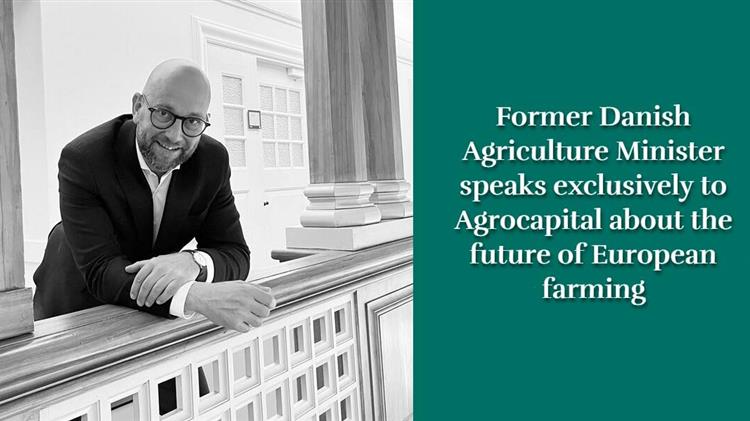Agro World News: Former Danish Agriculture Minister speaks exclusively to Agrocapital about the future of European farming

After a ministerial term marked by bold policy moves, innovative strategies for the agri-food sector, and a steadfast effort to bridge tradition with technology, former Danish Minister for Food, Agriculture and Fisheries Rasmus Prehn sits down with Agrocapital. In an in-depth conversation with Giorgos Bakolas, the Danish politician analyzes how Denmark managed to emerge as a global model for sustainable agriculture, while maintaining competitiveness and social cohesion in the countryside.
—Mr. Prehn, Denmark, is internationally recognized as a pioneer in plant-based diets and progressive vegan food policies. How did you manage to integrate these trends without undermining the viability of traditional livestock farming and local producers?
Denmark has a long-standing tradition in pork production and dairy. Transitioning to a more plant-based diet wasn’t easy. The key was maintaining open and continuous dialogue with farmers, while utilizing EU support instruments, such as the CAP. We offered farmers economic incentives and realistic time frames to adopt new practices. Planning, trust, and inclusion were the pillars of this transition.
—In an era when Europe’s primary sector is strained by climate shocks, price volatility, and administrative burden, what was your strategy to safeguard the competitiveness of Danish agriculture without compromising sustainability?
Again, collaboration with farmers’ organizations proved crucial. We supported the continuation of traditional production at a smaller scale, while actively boosting plant-based initiatives. Denmark built demand for plant-based food and offered security of uptake, helping farmers gain confidence in the shift.
— Denmark has invested heavily in agri-food innovation and the circular economy. How did you manage to connect farmers with research and biotechnology in practical, on-the-ground terms?
There’s a decades-long tradition in Denmark of close collaboration between farmers, researchers, and technology developers. This ecosystem facilitated a smoother transition to a more circular and sustainable food model. Farmers already had the mindset and infrastructure. Naturally, tensions arose, but I prioritized direct, personal engagement not only with organizations but with individual farmers in the fields.
— As the European Union prepares the next Common Agricultural Policy post-2027, what are the three most crucial reforms you believe are needed?
First, the CAP must reward farmers based on their tangible environmental and climate performance. Second, we must shift the balance toward plant-based food and reduce excessive livestock subsidies. And third, we need to align dietary change with environmental goals. Healthier eating and climate resilience go hand in hand. The CAP must embrace this logic and resist regressive pressures.
— Looking back on your time in office, what was the most difficult yet instructive decision you had to make?
Creating a broad cross-party political agreement on agricultural policy after more than six months of negotiations. We brought together parties across the spectrum and ended up with a deal supported by over 90% of Parliament. That political stability was vital for farmers to trust the reforms and commit to long-term change.
— Many European farmers feel increasingly alienated from political decision-making. How can the new generation of leadership rebuild trust and bring their voice back into Europe’s core policymaking?
By being physically present in the countryside, not only through associations but also face-to-face. Politicians need to walk the fields, listen, and base policies on real experiences from the ground up. Bottom-up policymaking is essential for restoring legitimacy and inclusion.
Mr. Prehn emphasized a message with particular relevance for Greece: “Even in Denmark, consumers can be conservative. Change doesn’t happen overnight. But if children experience and enjoy plant-based, organic food in schools, they can influence their families too. Change starts at the dinner table.”
Denmark, as Rasmus Prehn describes it, is not merely a model of technocratic excellence in the green transition of agriculture—it is a laboratory of political consensus, civic dialogue, and cultural transformation. At the core of that experience is the belief that farmers are not just recipients of decisions but co-creators of the future. As the former Minister candidly noted: “If we don’t move from big policy talks to the small everyday tables in schools, canteens, and markets—then the green transition will remain on paper.”
In a Europe urgently searching for new standards of credibility, participation, and ecological responsibility, the Danish case offers not a set of prescriptions, but inspiration and, most of all, a call to reclaim politics with people and land at its center.
Ακολουθήστε το Agrocapital.gr στο Google News και μάθετε πρώτοι τις ειδήσεις
Οι απόψεις που εκφράζονται στα σχόλια των άρθρων δεν απηχούν κατ’ ανάγκη τις απόψεις της ιστοσελίδας μας, το οποίο ως εκ τούτου δεν φέρει καμία ευθύνη. Για τα άρθρα που αναδημοσιεύονται εδώ με πηγή, ουδεμία ευθύνη εκ του νόμου φέρουμε καθώς απηχούν αποκλειστικά τις απόψεις των συντακτών τους και δεν δεσμεύουν καθ’ οιονδήποτε τρόπο την ιστοσελίδα.




